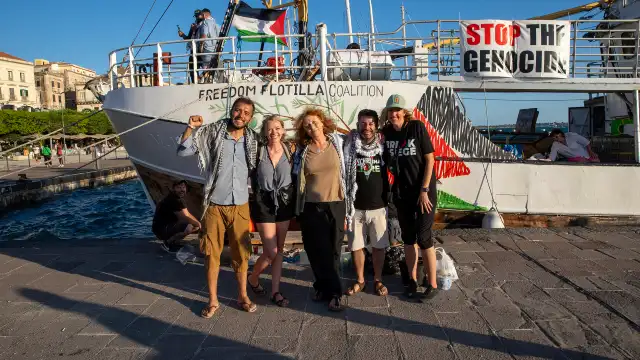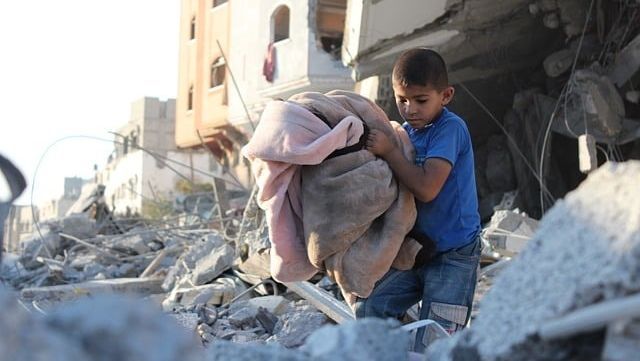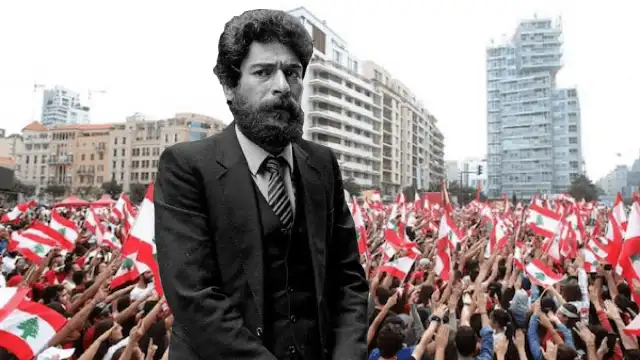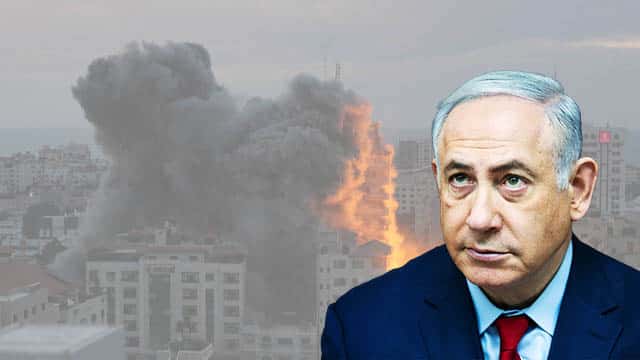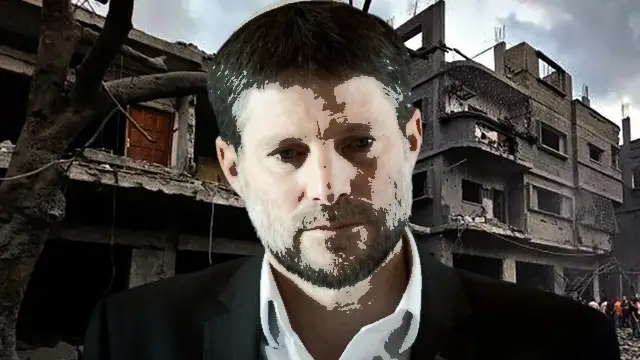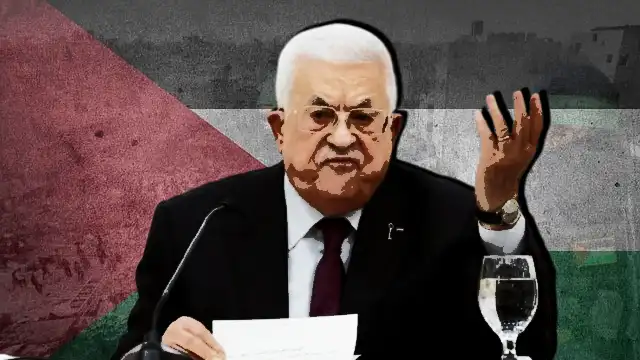The Mediterranean waves carry more than salt spray this July morning. They bear the weight of international defiance as the Freedom Flotilla Coalition’s Handala ship cuts through contested waters towards Gaza’s blockaded shores.
According to the latest reports, Handala, ship named NAVARN (MMSI: 232061752), is approximately 600nm away from the Gaza Strip and will take four days, ie, will reach its destination by Sunday, July 27th, at its current speed of 6.3nm per hour.
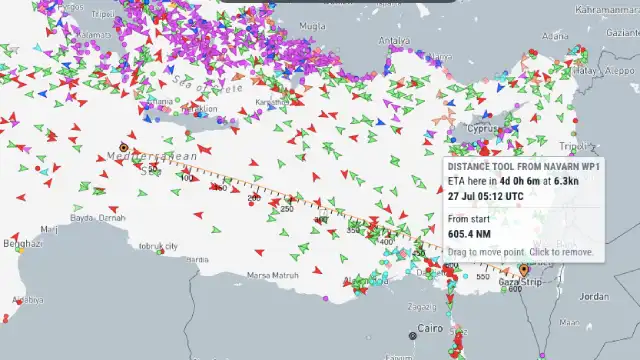
Nineteen human rights defenders and two journalists departed Gallipoli, Italy, on Sunday, July 20th, aboard a vessel that represents far more than humanitarian aid delivery.
Yet their mission unfolds under the shadow of recent attacks that transformed previous rescue attempts into scenes of maritime violence.
The question haunting this latest expedition proves grimly simple—will the Freedom Flotilla Coalition’s Handala ship suffer the same fate as its predecessors, or might international pressure finally restrain Israeli forces from repeating their pattern of aggressive intervention?
Pattern of violence at sea
The Handala’s voyage represents the third attempt by the Freedom Flotilla Coalition to challenge Israel’s siege of Gaza.
Previous missions ended in attacks that violated international maritime law, while exposing the lengths to which Israeli forces will go to maintain their blockade.
These precedents cast ominous shadows over the current expedition.
The major assault occurred on May 2nd, when Israeli drones attacked the Conscience in international waters near Malta.
Armed drones struck the civilian vessel twice at 12.23am Maltese time, causing fires and substantial hull breaches.
The attacks appeared deliberately calculated to disable the ship’s generator, leaving the crew without power and facing potential disaster.
The Conscience had been operating under a media blackout to prevent sabotage.
Volunteers from over 21 countries had travelled to Malta for the Gaza mission.
Their careful planning proved insufficient against the Israeli determination to prevent any challenge to the blockade.
The ship’s SOS distress signal brought limited assistance, while Israeli drones continued circling the damaged vessel.
Madleen’s capture
June brought fresh evidence of Israeli aggression when its forces seized the Madleen in international waters on June 9th.
The operation demonstrated systematic preparation for intercepting humanitarian missions regardless of their location or legal status.
Twelve activists aboard the Freedom Flotilla Coalition vessel found themselves abducted and transported to Israel against international law.
Swedish climate activist Greta Thunberg numbered among those detained.
Four activists, including Ms Thunberg, accepted swift deportation after waiving their rights to see an Israeli judge.
They signed deportation orders that falsely claimed they had “illegally” entered Israel, despite their capture occurring in international waters.
Eight activists refused to cooperate with this legal fiction.
They remained in detention for days, and six faced deportation.
Among them was Rima Hassan, a French-Palestinian member of the European Parliament whose diplomatic status failed to protect her from Israeli custody.
Gaza’s engineered starvation
The Freedom Flotilla Coalition’s Handala ship carries humanitarian aid to a population facing deliberately engineered famine.
Since March 2nd, 2025, Israel has barred all aid trucks from entering Gaza.
This policy affects over two million civilians who face starvation while the international community watches.
Humanitarian experts estimate that Gaza requires at least 600 aid trucks daily to meet basic needs.
For more than four months, not a single truck has been permitted entry.
This systematic starvation represents a clear violation of international humanitarian law, yet it proceeds with apparent impunity.
The blockade operates alongside continuous bombardment that has devastated Gaza for 21 months.
Israeli forces target civilian infrastructure while preventing international assistance from reaching desperate populations.
The Freedom Flotilla Coalition’s missions represent rare attempts to challenge this comprehensive siege.
Freedom Flotilla Coalition’s Handala ship’s crew faces unknown threats
The current mission assembles an impressive array of international activists committed to challenging the blockade despite obvious personal risks.
Christian Smalls, founder of the Amazon Labor Union, joins Palestinian-American human rights attorney Huwaida Arraf aboard the Freedom Flotilla Coalition’s Handala ship.
Amazon Labor Union leader Chris Smalls @Shut_downAmazon is on the #Handala, the 37th ship to challenge Israel’s illegal siege on #Gaza. Amazon has invested billions in intelligence like the Nimbus project, used for the surveillance and targeting of Palestinians.
— Freedom Flotilla Coalition (@GazaFFlotilla) July 21, 2025
Chris shares… pic.twitter.com/Hw5hfpLFlA
All eyes on @GazaFFlotilla
— Rashida Tlaib (@RashidaTlaib) July 22, 2025
Join us tomorrow https://t.co/iuKF59tIkN
European Parliament member Emma Fourreau and French parliamentarian Gabrielle Cathala lend political legitimacy to the expedition.
The crew spans twelve countries and includes diverse professionals united by opposition to Israeli policies.
Dr Frank Romano brings legal expertise, while Jewish-American activists Jacob Berger and Bob Suberi demonstrate that criticism of Israeli actions transcends religious boundaries.
I asked Jacob Berger why he joined the Handala freedom flotilla as part of the crew onboard sailing to Gaza. He speaks about using his privilege as a Jewish American to help bring humanitarian aid by challenging Israel’s illegal siege on Gaza. pic.twitter.com/6bimsPsrJQ
— Yipeng Ge 葛义朋 (@yipengGe) July 22, 2025
Norwegian activist Vigdis Bjorvand, at 70 years old, represents five decades of commitment to international justice.
Journalists Mohamed El Bakkali from Al Jazeera and Iraqi-American cameraman Waad Al Musa document the mission while facing the same risks as the activists.
Their presence ensures that any Israeli attack will receive immediate international coverage, potentially restraining military responses.
However, the chances are thin that Israel will limit its response, fearing international media backlash as it manages to rally the American lawmakers behind its genocidal policies, a guarantee to override international moral whistles.
Diplomatic immunity remains ineffective
The presence of parliamentarians aboard the Freedom Flotilla Coalition’s Handala ship tests whether diplomatic status provides protection against Israeli aggression.
Rima Hassan’s detention despite her European Parliament membership suggests that Israel disregards diplomatic immunity when convenient.
This precedent raises serious questions about the safety of current parliamentary participants.
International law clearly protects civilian vessels in international waters, yet previous attacks demonstrate Israeli willingness to violate these protections systematically.
The careful composition of the Handala’s crew, including elected officials and prominent activists, appears designed to raise the political cost of military intervention.
Whether these calculations prove sufficient remains uncertain.
Israeli Prime Minister Benjamin Netanyahu faces International Criminal Court (ICC) arrest warrants for his genocidal actions in Gaza.
Although the ICC warrant restricts Mr Netanyahu’s international travel, however, it doesn’t stop him from carrying out his assaults on Palestinian civilians, apart from attacking other countries in the neighbourhood, and from flying to the US to seek aid and help from the White House.
These legal pressures might encourage restraint, or they might prompt more aggressive action to demonstrate continued power.
Freedom Flotilla Coalition’s Handala ship tests international resolve
The Freedom Flotilla Coalition’s Handala ship represents more than humanitarian aid delivery. It embodies international determination to challenge systematic violations of human rights and maritime law.
The vessel carries life-saving supplies alongside a direct political message that the blockade must end.
It raises a major question — can the international community allow Israel to even attack and destroy this convoy?
Previous attacks revealed the international community’s limited willingness to protect humanitarian missions.
As the activists are not going against the West’s official foes like China, Iran, North Korea, or Russia, but its favourite colonial project, there has been a cold response towards these gross human rights violations by Mr Netanyahu’s regime.
The Conscience’s distress signals brought inadequate assistance while Israeli drones maintained their threat. The Madleen’s crew faced detention and deportation without meaningful diplomatic intervention.
This pattern raises troubling questions about international law’s effectiveness when major powers choose to ignore it.
The Freedom Flotilla Coalition operates within legal frameworks that appear increasingly meaningless against determined state violence.
Uncertain waters ahead
As the Freedom Flotilla Coalition’s Handala ship continues its journey towards Gaza, the crew faces known dangers with unknown outcomes.
Previous attacks on the Freedom Flotilla Coalition’s ships established clear precedents for Israeli aggression, yet international pressure might finally produce different results.
The composition of the current crew, including parliamentarians and prominent activists, raises the stakes for any military intervention.
Still, as it’s Israel on the other side, one can’t predict the response level.
The mission occurs while Gaza’s population faces systematic starvation and continuous bombardment.
International institutions prove incapable of preventing these violations or protecting those who attempt to challenge them.
The Freedom Flotilla Coalition’s efforts highlight both the urgency of Gaza’s humanitarian crisis and the inadequacy of international responses.
Whether the Handala reaches its destination safely depends on calculations occurring in Israeli military headquarters and political offices.
The ship’s diverse crew represents international determination to challenge the blockade, yet their safety relies on restraint from forces that have shown little regard for civilian lives or international law.
The Mediterranean’s waves carry more than humanitarian supplies this July.
They bear witness to a test of international resolve that will determine whether systematic violations of maritime law and human rights can proceed without consequence.
The Freedom Flotilla Coalition’s Handala ship sails towards an uncertain fate that will reveal much about the current state of international justice.
Join our channels on Telegram and WhatsApp to receive geopolitical updates, videos and more.

